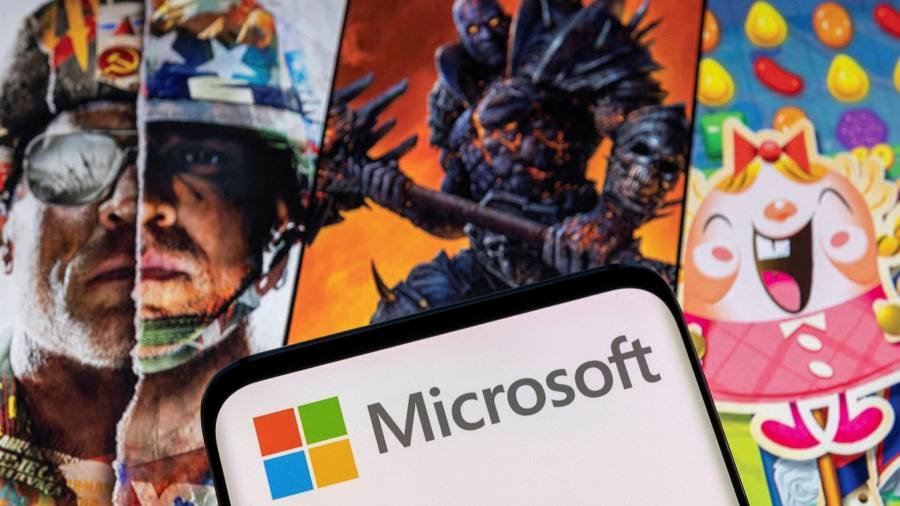At around 8:30pm in early December last year, the sofa-sitters of Britain shattered a record that both everybody and nobody wanted broken. That evening, for the first time, Amazon Prime was live-streaming six midweek Premier League football matches simultaneously. As a consequence, UK internet traffic (already heightened by a nation working from home and sheltering indoors from the pandemic) spiked to 25.5 terabits of data per second.
That was well above the level the UK telecoms company BT had previously pledged it could handle and, by some margin, the heaviest the UK had ever clocked. For Amazon, the Premier League, telecoms providers, content producers and consumers, the record was a thrilling landmark of potential — and a sobering glimpse of the limit.
On the night, BT’s network managed to hold fast. But longer-term, the incident casts a shadow over the ambitions of the world’s biggest companies (including Microsoft’s $75bn mega-lunge for video game maker Activision Blizzard) and the most enticing techno-fantasy of the moment.
If the first few weeks of 2022 are any guide, it is becoming harder to engage large parts of the corporate world without some mention of the metaverse. The future of vehicle crash testing, confided the founder of one auto engineering start-up, is in dummy-free simulations in the metaverse. Real estate investment, said one Hong Kong-based equity strategist, will inevitably extend to “digital twins” of existing property. The great revival of the iconic Hello Kitty brand, the chief executive of Japan’s Sanrio told the FT, depends on building her ubiquity in the metaverse.
The list goes on. For some, the term is used as a shorthand for the more pervasive and immersive direction in which the internet appears to be heading. For others — particularly the evangelists at games and social media companies — it is a more explicit forecast that an ever-greater proportion of our work and leisure time will be spent in virtual environments and parallel digital worlds.
Microsoft’s announcement last week that it planned to buy Activision (a deal that many analysts suspect could be transformational for the games industry), falls into the second category. The acquisition, said Microsoft’s chief executive Satya Nadella in the accompanying statement, was intended to accelerate the company’s gaming business across the cloud and “provide building blocks for the metaverse”.
Whatever its commercial logic, the bid has served to crystallise the idea that the metaverse is where all the really interesting tech rivalries and power struggles of coming years will play out. Sony’s share price fell heavily on word of the deal. Microsoft’s move seemed crafted to eclipse the Japanese giant’s mix of games, music, movies and virtual reality, which had looked to investors like a perfect metaverse-ready combo.
Yet all the speculative poetry of what might eventually be possible in the metaverse, say experts on the data networks that underpin its future, is jumping far ahead of more prosaic reality. A fully working virtual world, or even just a real-time, high-definition immersive experience, will require far, far more capacity to transmit data between the consumer and network than is currently available in homes around the world. The fantasy of the metaverse has been allowed to flourish, they add, before any meaningful debate has been had on how it will happen practically, and who (the users, the telcos or the metaverse-builders) should pay for the infrastructure.
A month into the pandemic, in 2020, BT’s chief technology officer reassured the UK that while homeworking had increased traffic on the fixed network to a peak of 7.5 terabits per second, that was still a way off the 17.5tb/s that “we have proved the network can handle”.
Nearly two years and a deluge of metaverse chatter later, and BT’s breeziness is gone. The rollout of fibre broadband provides notional capacity, but the limiting factor will be the networks the telcos run over. Marc Allera, chief executive of its consumer division, blogged the day after the 25.5tb/s record that the company foresaw problems. He was not alone: telcos around the world were confronting similar headaches even before the metaverse peddlers stepped-up their pitch. The capacity for content, wrote Allera, is not infinite and “the exponential growth of data will, in the future, pass what we can reasonably be expected to build — or indeed expect consumers to have to pay for.”
There is a temptation to read this view as a kind of digital Malthusianism: a warning that, while legitimate now, will ultimately be solved by tech. That may yet happen, but it will be on a far longer timeframe than this generation of metaverse cheerleaders imagine.
leo.lewis@ft.com

